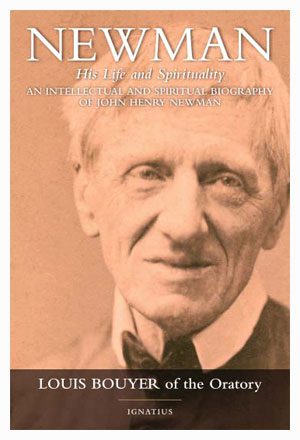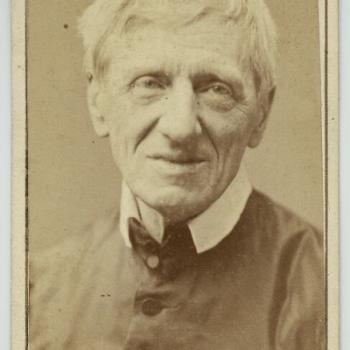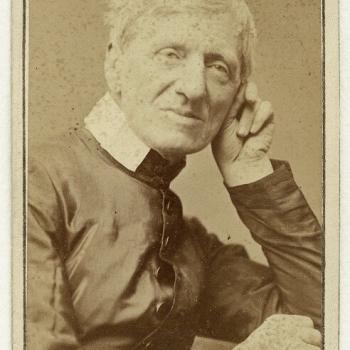[purchase the above book at Amazon; also my own book of Newman quotations]
* * * * *
I have long been interested in developing arguments for what might be variously described as “tacit knowing” (philosopher Michael Polanyi), or implicit, innate, interior knowledge; the “illative sense” (Newman), or “properly basic belief” (Alvin Plantinga). Not all “evidence” or knowledge is empirical in nature. Religious faith is of this type, at least in some key respects. Polanyi is thought to have effectively dismantled logical positivism as a be-all / end-all epistemology in the early 1950s. I’ve collected many articles about this type of thought from the most able proponents I could find, in my collection of 15 Theistic Arguments (see #2).
Trying to describe, let alone defend tacit knowledge is a daunting task. I gave it a shot in a lengthy dialogue with agnostic JD Eveland, in a discussion about Plantinga’s “basic belief.” Recently, in a dialogue with an atheist about hell and skepticism, I attempted to describe these aspects in popular or nutshell fashion, in my own words (slightly abridged slightly here):
Virtually no one comes to initial faith in Jesus or conversion to Christianity through apologetics (and I know this firsthand, due to my own 34-year apologetics efforts, as both a Protestant and Catholic). I didn’t, myself. It is an interior spiritual experience or awareness which is key.
Lots of things are determined on a non-rational basis, such as choice of food, favorite colors for a room or clothes, picking a marriage partner, what determines the friends we pick out, the music we like, appreciation of nature or artistic beauty . . .
We don’t say that all of that is UNreasonable, simply because rationality is not the sole or primary determinant of those choices. It’s simply “other” than rationality. Matters of the heart or artistic taste are that. But I don’t see people running around chiding others for having a “blind faith” in Beethoven or the color blue or lovely sunsets or a preference for petite brunettes with big beautiful eyes (characteristics my wife has). We don’t call poets irrational simply for being poets. Yet poetry is a very subjective, often non-logical endeavor.
Likewise, religion is one of those things that function mostly on a basis of things other than reason and logic per se, while not necessarily being illogical or unreasonable.
Atheists say that Christians are anti-science merely because we also believe in God and think there are other epistemological considerations and ways of determining truth, like philosophy, and other philosophies besides the narrow atheist bubble-world of empiricism and logical positivism.
I would submit that most atheists don’t become so by virtue of cold, calculated logic. The reasons are usually highly subjective and emotional: they’re sick and tired of Christian rules, or they see Christians as hypocrites or sexually repressed or authoritarian or puritanical in a nauseating way, or they view them as opposed to science or reason.
These are all primarily subjective and emotional reasonings; ones of passion and defensiveness and being fed up. And they are the reasons we observe times without number in atheist rhetoric. The “reasons” for your atheism are manifest in what you guys talk (and complain about). Atheists talk far more like disgruntled former employees or husbands / wives than dispassionate, objective philosophers.
And atheist reasonings and logical arguments are mostly accepted after the fact as well, just as Christian apologetics resonates far more with existing Christians than to non-Christians. This is how most people (theists and atheists alike) operate.
John Henry Cardinal Newman (1801-1890) was an extraordinary thinker. It is thought that he developed his notions of the “illative sense” and innate knowledge (especially as regards religious faith) as early as 1833, and reflected upon it off and on for 37 years, culminating in his masterpiece of Christian epistemology, Essay in Aid of a Grammar of Assent (1870). Charles Frederick Harrold, in his Introduction to the Grammar of Assent in a 1947 edition, wrote:
It is in the Oxford University Sermons (1843) that we see Newman deliberately engaged on “an exploring expedition” to determine the nature of faith and reason, to show the grounds on which the (logically) untrained believer justifiably holds his belief, namely through “implicit” or unconscious reasoning, against a background of a “right state of heart.” In these sermons Newman is convinced that conscience gives us a glimpse of reality behind the physical world so piercing and compelling that we place it on a level with our knowledge of the external world as delivered through reason and the five senses. He is sure that logic is inadequate to a complete statement of our mental process, since so much of our reasoning is done subconsciously, mingling memories, emotions, associations with its strictly ratiocinative elements. Yet it is all this complex of conscious and subconscious activity that propels a man toward an assent. Again, “the whole man reasons,” not just the “mind” . . .
In Sermon 13 from that collection: “Implicit and Explicit Reason” (1840), Newman lays out his basic thesis (paragraph breaks are breaks in the cited text):
Nothing would be more theoretical and unreal than to suppose that true Faith cannot exist except when moulded upon a Creed, and based upon Evidence; {254} yet nothing would indicate a more shallow philosophy than to say that it ought carefully to be disjoined from dogmatic and argumentative statements. To assert the latter is to discard the science of theology from the service of Religion; to assert the former, is to maintain that every child, every peasant, must be a theologian. Faith cannot exist without grounds or without an object; but it does not follow that all who have faith should recognize, and be able to state what they believe, and why. Nor, on the other hand, because it is not identical with its grounds, and its object, does it therefore cease to be true Faith, on its recognizing them. . . . True Faith, then, admits, but does not require, the exercise of what is commonly understood by Reason. (4)
Reason, according to the simplest view of it, is the faculty of gaining knowledge without direct perception, or of ascertaining one thing by means of another. In this way it is able, from small beginnings, to create to itself a world of ideas, which do or do not correspond to the things themselves for which they stand, or are true or not, according as it is exercised soundly or otherwise. One fact may suffice for a whole theory; one principle may create and sustain a system; one minute token is a clue to a large discovery. The mind ranges to and fro, and spreads out, and advances forward with a quickness which has become a proverb, and a subtlety and versatility which baffle investigation. It passes on from point to point, gaining one by some indication; another on a probability; then availing itself of an association; then falling back on some received law; next seizing on testimony; then committing itself to some popular impression, or some inward instinct, or some obscure memory; . . . And such mainly is the way in which all men, gifted or not gifted, commonly reason,—not by rule, but by an inward faculty. (7)
Here, then, are two processes, distinct from each other,—the original process of reasoning, and next, the process of investigating our reasonings. All men reason, for to reason is nothing more than to gain truth from former truth, without the intervention of sense; to which brutes are limited; but all men do not reflect upon their own reasonings, much less reflect truly and accurately, so as to do justice to their own meaning; but only in proportion to their abilities and attainments. In other words, all men have a reason, but not all men can give a reason. We may denote, then, these two exercises of mind as reasoning and arguing, or as conscious and unconscious reasoning, or as Implicit Reason and Explicit Reason. And to the latter belong the words, science, method, development, analysis, criticism, proof, system, principles, rules, laws, and others of a like nature. (9)
Faith, then, though in all cases a reasonable process, is not necessarily founded on investigation, argument, or proof; these processes being but the explicit form which the reasoning takes in the case of particular minds. (15)
Martin X. Moleski, S. J., is a Newman scholar, whose dissertation was devoted to the relation of Newman’s and Polanyi’s epistemological thought (Polanyi read Newman’s Grammar of Assent twice). In a 1999 lecture, “Personal Catholicism,” he provided a fabulous short summary of Newman’s thinking in this area citing him from Grammar:
A great many of our assents are merely expressions of our personal likings, tastes, principles, motives, and opinions, as dictated by nature, or resulting from habit; in other words, they are acts and manifestations of self: now what is more rare than self-knowledge? In proportion then to our ignorance of self, is our unconsciousness of those innumerable acts of assent, which we are incessantly making. And so again in what may be almost called the mechanical operation of our minds, in our continual acts of apprehension and inference, speculation, and resolve, propositions pass before us and receive our assent without our consciousness. Hence it is that we are so apt to confuse together acts of assent and acts of inference. Indeed, I may fairly say, that those assents which we give with a direct knowledge of what we are doing, are few compared with the multitude of like acts which pass through our minds in long succession without our observing them. (p. 157)
This is the mode in which we ordinarily reason, dealing with things directly, and as they stand, one by one, in the concrete, with an intrinsic and personal power, not a conscious adoption of an artificial instrument or expedient; and it is especially exemplified both in uneducated men, and in men of genius,–in those who know nothing of intellectual aids and rules, and in those who care nothing for them,–in those who are either without or above mental discipline. (p. 261)
Thus in concrete reasonings we are in great measure thrown back into that condition, from which logic proposed to rescue us. We judge for ourselves, by our own lights, and on our own principles; and our criterion of truth is not so much the manipulation of propositions, as the intellectual and moral character of the person maintaining them, and the ultimate silent effect of his argument or conclusions upon our minds. (p. 240)
We proceed by a sort of instinctive perception, from premiss to conclusion. I call it instinctive, not as if the faculty were one and the same to all men in strength and quality (as we generally conceive of instinct), but because ordinarily, or at least often, it acts by a spontaneous impulse, as prompt and inevitable as the exercise of sense and memory. We perceive external objects, and we remember past events, without knowing how we do so; and in like manner we reason without effort and intention, or any necessary consciousness of the part which the mind takes in passing from antecedent to conclusion. (p. 209)
Moleski interprets Newman’s reasoning as follows (with which we shall conclude):
The passionate roots of our convictions cannot be brought wholly into the light of analysis. Even when we are able to dig them out for examination, they cease to function as roots so long as they are exhumed from the ground of personal knowledge that gave them life. When the mind is operating normally, without straining to catch itself in the act of understanding, it is the illative sense that draws upon the roots of knowledge implicitly, without seeing directly how it is that these lines of passion transmit what is necessary for thought and provide stable frameworks for growth.
Newman spoke of the illative sense as an instinctual operation of the mind. Though the term “instinct” may be fraught with difficulties, depending on the model used to interpret this term, Newman’s primary concern was to call attention to the fact that the vital functions of our minds have a life of their own that we rely on tacitly. . . .
It seems clear that in his discussion of the illative sense as an instinctive operation, Newman affirmed as a matter of fact that we know more than we can tell about how the mind moves itself to conclusions. . . .
Newman was convinced that it is wrong to assume that “whatever can be thought can be adequately expressed in words.” Since we cannot inspect others’ interior processes, we can only see for ourselves in our own patterns of consciousness that there are indeed “acts of the mind without the intervention of language.” Newman was conscious of the paradox of attempting to speak about that which language cannot adequately express, and he concedes that examples which confirm his position “are difficult to find, from the very circumstance that the process from first to last is carried on as much without words as with them.”













